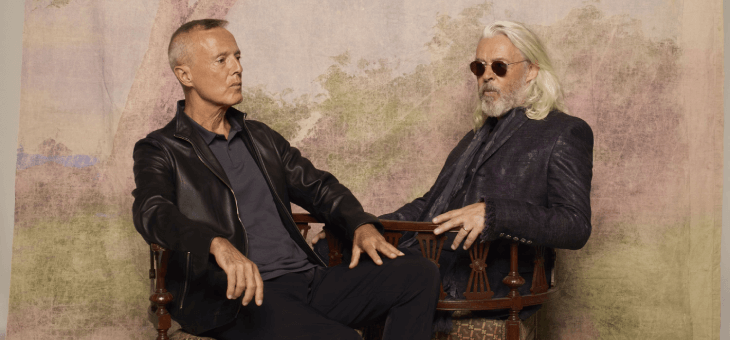In the 1980s, Roland Orzabal and Curt Smith made it their mission to engage with difficult topics such as childhood trauma, primal scream therapy and mental health.
Timeless tracks such as Mad World, Everybody Wants To Rule The World and Shout saw them shroud those issues in catchy choruses and stadium-sized synths. Ultimately, this combination made them unlikely pop icons.
Now, 17 years since they last released an album of new music, the pair are back. Orzabal and Smith are both now 60 and releasing their seventh studio album The Tipping Point. Fans will be pleased to discover their latest project rediscovers this rawness.
“When music comes from a place of honesty, it just is more powerful – simple as that,” says Smith from his home in Los Angeles.
Read: Roger Taylor on writing new music
Tears For Fears’ 2022 studio album reflects the personal and professional tipping points they have faced since their last album, 2004’s Everybody Loves a Happy Ending. These include rebuilding their previously fractious relationship, the politics of Smith’s adopted home of America, and Orzabal’s experience of losing his wife of nearly 40 years.
today’s the final day to sign up for The Tipping Point World Tour 2022 pre-sale access. uk fans, make sure you’ve preordered #thetippingpoint in your favourite format to get your pre-sale code. https://t.co/GNkoqLKCzR pic.twitter.com/xJLto1gu9D
— Tears for Fears (@tearsforfears) November 16, 2021
The Tipping Point’s 10 tracks sound unlike any of their previous albums. But it took some time to arrive here. After three successful albums across the ’80s, there was an acrimonious split and the pair explored solo projects. In 2004, they reunited for a new album but failed to reignite the fruitful creative partnership (or the sales figures) of their heyday.
Nevertheless, they continued to tour and, at the behest of their then manager, went into the studio with an array of external songwriters. This was not a success.
“It was an interesting exercise,” says Smith carefully. “I’m not knocking necessarily the premise. We went along with it. It didn’t seem that alien to us, particularly at the time.
“But then you get into it and realise, ‘Ah, this is not really working, and this is not us’. This is us attempting to be something else. Effectively, something we’re not.
Mi famiglia ❤️ Proud Papa at Diva’s graduation @NYUGallatin here she comes ? pic.twitter.com/bfi6l5738W
— Curt Smith (@curtsmith) June 15, 2018
“I spent the last bunch of years doing college tours with my kids and half the battle for them to choose a college was finding out where they didn’t want to be. Then, after that, you would then whittle down to where you want to be. And it seemed obvious to me early on that that was nowhere that I particularly wanted to be.”
Read: How music can boost your wellbeing
Eventually, Orzabal and Smith got together for a crisis meeting. They sat down with acoustic guitars at Smith’s home and began to write, without any outside interruptions. “That chunk of music was the opposite to anything we had attempted before,” Orzabal recalls from his mother-in-law’s home in Colorado.
“It wasn’t commercial, it wasn’t pop music. It was folk, it was blues, it was country. It was Johnny Cash. Who knows?”
He took the song away and it became No Small Thing, with its poignant refrain about personal freedom. That was the jumping-off point for the rest of the album.
Orzabal puts that moment in stark terms: “It was this relief,” he explains. “The sense of freedom we had, being able to do what we wanted. And we have earned that right.”
View this post on Instagram
Orzabal’s wife of nearly 40 years, Caroline, died in 2017 after struggling with depression. Four years later, after meeting and marrying writer and photographer Emily Rath, he feels ready to share music inspired by that time, and the song Please Be Happy recalls his experience in stark detail.
“That’s a very moving song for me,” he offers. “Watching my wife struggle with depression to the point where it was was killing her, as was the alcohol. And those two things are sometimes indivisible and, until you take alcohol and pills out of the equation, you’re never going to get to the heart of someone’s mental problems.
“Watching her was heartbreaking and that’s a very poignant part of the record, I must say. The first line Curt sings, I have to leave the room. Oh yeah, I can’t bear it. But that’s what we’re here for.”
Read: The legendary Diana Ross announces new album
Tears For Fears were ahead of the curve when they sang about topics such as depression and even psychoanalysis in the ’80s.
“This is progress,” Orzabal says. “The role of the artist is to try and progress things in society and make things that were not acceptable become acceptable, slowly. And there’s no better way of doing it than in music.
Is it February yet? #TheTippingPoint pic.twitter.com/FZFk0Psexw
— Tears for Fears (@tearsforfears) October 12, 2021
“It seeps in through your eyes and creeps inside your brain. Or something like that – to quote one of my lyrics from the new album.
“We’re happy about it – very, very happy about it indeed. And, having had my own mental illness struggles recently after the death of my wife, I am glad we can talk about it now.”
– With PA
If you enjoy our content, don’t keep it to yourself. Share our free eNews with your friends and encourage them to sign up.

